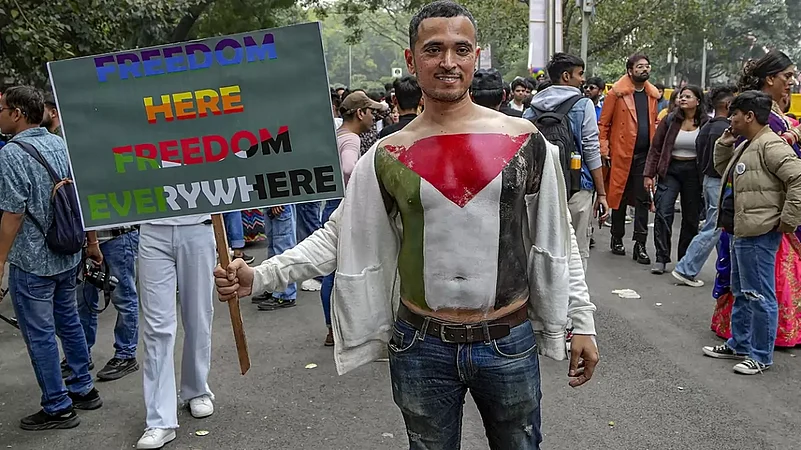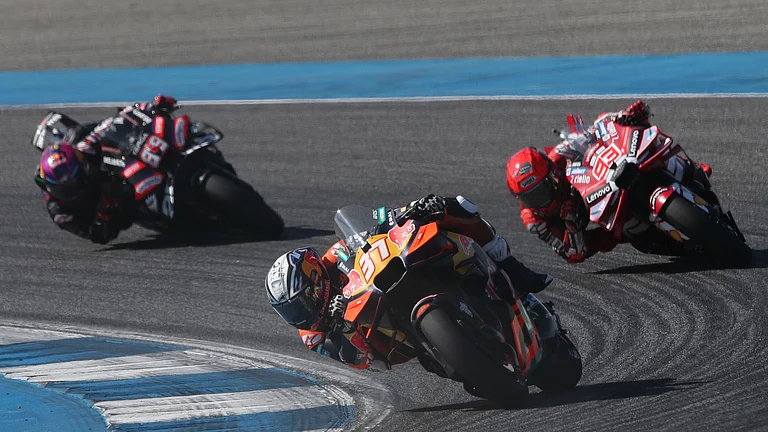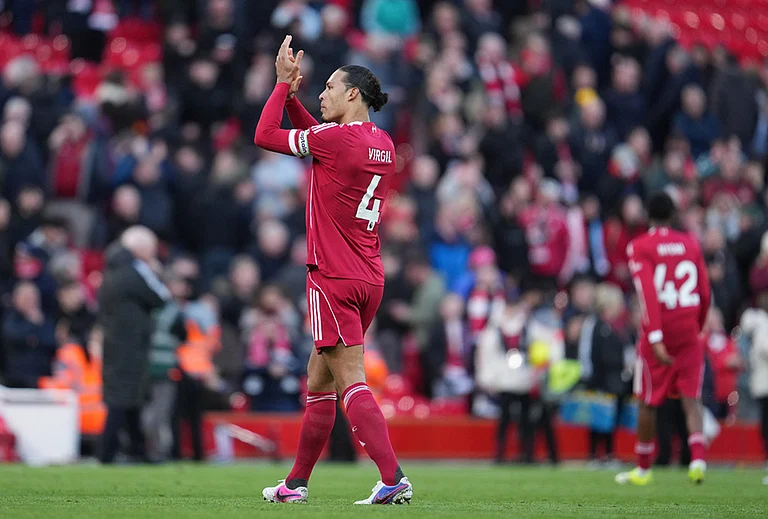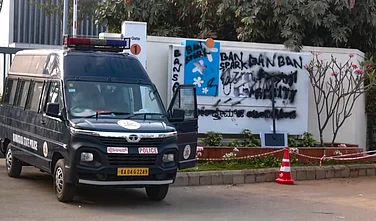Carol Hanisch’s 1969 quote “personal is political” got a modern retelling at this year’s Delhi Queer Pride Parade on November 26. Just like the previous march this January, it started at Barakhamba Road and concluded at Jantar Mantar amid vociferous cheers of besharam Bollywood pyaar.
The march which spanned for three hours saw a turnout of more than a thousand Delhites who shed away their sullen November woollens to flaunt the many colours of their identity. However, this time around, the air was not just a celebration of one’s unique identity. For it was thick with something that has never been witnessed on such a massive scale before — dissent.
Unlike the phrase which was restricted to feminist circles, we saw a coming together of individuals from diverse socio-ethnologic backgrounds. These very people who have long been deprived of a platform to voice out their cause finally found an outlet to show dissent. We saw a counterculture to the pressing issues that have long deprived the community of their basic rights, be it their ongoing battle to marry whomever they want, the ostracism faced by queer youth in institutions due to lack of protection framework, or the hate and bullying they are subjected to in the unregulated cyberspace.
“This time we had the pride to voice out our opinions, the change we need, and our sufferings. We have many issues that require major and immediate attention starting from cyberbullying leading to rampant suicides. It was Arvey first and now Pranshu. We can’t keep losing queer kids like that,” said Ayushi Krishna, a computer applications student who also belongs to the queer community.
A Canvas For Muffled Protests
This year, the Delhi Queer Pride Parade transcended its traditional avatar as it was not just a celebration but as it was as if the party itself had donned the cloak of protest. Banners, signs, and chants became powerful tools for expressing discontent with the current state of affairs and demanding change.
The parade became a rallying point for activists to push for inclusivity, equality, and societal acceptance. It served as a nexus of celebration, activism, and awareness, embodying the community's resilience and determination.
“Pride has always been political and a form of protest. As queers, we express our protest in a different manner — colourful, loud, and proud. This time, there was a stronger emphasis on protests, possibly influenced by the challenging sociopolitical climate both nationally and globally. Despite these daunting challenges, we remain determined to continue the fight and demonstrate that we are here, we are queer, and we will persist,” said Suyash Srivastava, a volunteer with Delhi Queer Pride Parade.
Beyond Silhouettes: Remembering Queer Lives Lost
There was a gloomy sense of air looming around as it had been just five days that the community mourned the loss of yet another queer teen.
On November 21, a self-taught 16-year-old queer creator named Pranshu Yadav took died by suicide. Pranshu, a class 10 student at Ujjain Public School in Madhya Pradesh, had been sharing content related to make-up on Instagram. Around Diwali, they posted a transition reel in which they wore a saree, which was targeted by trolls on social media. The reel received more than 4,000 hate comments which did not stop even after their death.
Pranshu was not the first queer child who died by suicide and they certainly were not the last. There were chants against this recurring yet heartbreaking narrative — one where queer teenagers seek refuge from a world marred by hatred, bigotry, and relentless bullying, one where taking their lives seems to be an easier option.
Nearly two years have passed but Aarti Malhotra, mother of late Arvey who died by suicide in February 2022, continues her quest for justice. She marked her presence at the parade this year. Though shaky with emotions, amongst the sea of voices, her slogans rose above the cacophony.
Arvey, a 16-year-old student at the Delhi Public School in Greater Faridabad, left a note to his mother disclosing that he had been bullied and sexually assaulted at school, prompting his decision to die by suicide. Since then, Aarti has been seeking justice for Arvey. In this case, justice is both delayed and denied.
Arti said, “Arvey, my son, stands as a symbol for the quest for justice, and this fight resonates deeply with every youth in the community. Pride, in this context, emerges not just as a celebration but as a powerful platform that unites us in our collective pursuit for justice, amplifying our voices to address the challenges ahead.”
“However, there are other avenues too, such as rallies, online activism, and community forums, which also play vital roles in raising awareness and advocating for change,” added Arti, who has been advocating for the justice of her lost son on Instagram among other platforms.
The community continues to ask the question: How many more queer lives need to be lost before the society creates a safe space for them?
No One Is Free Unless All Are Free: Queers For Palestine
The pride flag was not the only one that soared in the sky at the Delhi Queer Pride Parade. There were also stripes of green, white, and black with a dash of red found its place.
The Delhi Queer Pride badge found the company of Free Palestine badges which were being distributed around. Printouts denouncing Western consumerist brands through snarky wordplay were a hit among the attendees.
In the last two months, Delhi has witnessed a chain of protests for the Palestinian cause that got muffled. What could be a boiling pot of suppressed anger and resentment led to ‘Queers for Palestine’ gaining momentum as a slogan on the P-Day.
This November, a photo of a gay Israeli soldier posing with the pride flag straight out of war-torn Gaza Strip sparked an outcry on the internet. The flag with “In the name of love” ironically sprawled across it was supposedly the “first ever pride flag raised in Gaza” as claimed by British comedian-script writer Lee Kern who first shared the photo on X (formerly Twitter).
This rekindled the entire debate around ‘pinkwashing’, the practice of attempting to benefit from purported support for LGBTQ+ rights, often as a way to profit or to distract from a separate agenda”.
On social media, some brushed it off as a “PR stunt”, while others called the post “vile” for “using the suffering of LGBTQ+ people to try and manipulate them into supporting a genocide”.
Love Unbound: No Right To Marry For Queers
“Modi ji, same-sex marriage ka haq kab denge?” read one of the many placards raised at the pride this year.
The spotlight was majorly on the recent Supreme Court verdict on the legalisation of same-sex marriage which left the community disheartened yet again. The parade featured a multitude of signs condemning the Apex Court’s lack of support and also witnessed parents and family members showing support for their queer children.
While members of the community held onto the hope that the Parliament would one day acknowledge same-sex marriages through legislation, those participating in the march believed that this surely is a far-reaching goal.
The quest for acknowledgement of LGBTQ+ rights in India has been a challenging journey. It was not until 2018 that the Supreme Court, following two decades of protests, legal battles, and opposition, ultimately decriminalised homosexuality.
Recently, in its decision, a five-member bench led by Chief Justice DY Chandrachud acknowledged that the LGBTQ+ community encounters discrimination from the state. However, the court refrained from engaging in “judicial lawmaking” regarding same-sex marriage, asserting that such a determination was beyond its scope and should be deliberated by the Parliament. Additionally, the court ruled against extending adoption rights to unmarried gay couples. The verdict yet again disappointed the LGBTQ+ community in India and they expressed this dismay at the parade.
“This pride was more than just celebrating our queerness. It was also about getting our personal issues out there for people in politics to know what is happening since I cannot go alone and say, ‘Hey! Let me have a wife and adopt a kid.’ I'll have to scream it loud in these pride parades,” said Ayushi Krishna, a computer applications student who also belongs to the queer community.
(Devanshi Batra and Roopashi Semalty are freelance journalists and students at the Jamia Millia Islamia, Delhi. Views expressed are personal.)





















